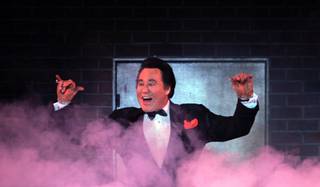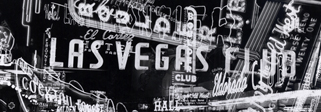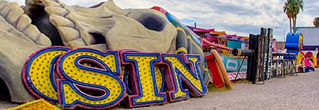Thursday, May 15, 2008 | 3 a.m.
Sun Coverage
In 1980, Wayne Newton, affectionately known as “Mr. Las Vegas,” got a taste of what Frank Sinatra had experienced for much of his life — accusations of mob association.
For Ol’ Blue Eyes, who readily posed for snapshots with shady-looking people who — surprise, surprise — turned out to be mobsters, such rumors only added to his tough guy legend. But similar allegations had the opposite effect on Newton, tainting his clean image.
After all, Newton was the fresh-faced kid who had won America’s hearts in 1963 with his swinging rendition of the syrupy pop song "Danke Schoen." How could someone so wholesome know any gangsters?
But in October 1980, an NBC News report said that Newton allegedly had ties to the mob, putting his life and potential gaming career in grave jeopardy.
Newton admitted that years earlier he had known Guido Penosi, a reputed member of the Carlo Gambino crime family of New York. However, Newton insisted that he did not know Penosi had alleged mob ties.
“It was ridiculous. I'm an Indian boy from Virginia, What do I know about the Mafia?" Newton told the Sun for an Aug. 18, 2000 story.
After that TV news report, the floodgates opened and stories surfaced that Newton, who co-owned the Aladdin (now Planet Hollywood), was the “front man” for the mob.
Even worse, some reports said that Newton was spilling the beans about the Mafia to law enforcement officials.
That gave Newton a new basketful of problems, including death threats because, as he put it, “the mobsters didn't know that I didn't know anything about them.”
When Newton arrived in Las Vegas after a performance in Los Angeles, FBI agents met him at McCarran International Airport and showed him a list they had obtained from an informant. It had five names – Newton’s and those of four slain men.
That was the last straw.
Newton sued NBC and won a $19 million defamation judgment. An appeals court later ruled that although the NBC report was inaccurate, there was no malice, therefore Newton, a public figure, could not collect damages.
"It was not about money, it was about clearing my name," Newton told the Sun. "And I did."
To date, Newton, has performed more than 30,000 shows in Las Vegas at several venues, most recently the Flamingo. From 2000 to 2005, he performed at the Stardust, where the showroom was named for him, and the Las Vegas Hilton.
In the 1970s, Newton worked at the Desert Inn, Frontier and Sands. In the 1980s it was Bally’s, Caesars Palace and the Las Vegas Hilton. In the 1990s, Newton headlined at the MGM Grand and, like many veteran Vegas performers, worked in Branson, Mo.
Newton, who performs worldwide, has served as chairman of the USO Celebrity Circle in recent years.
In September 2006, he was inducted into the Nevada Entertainer/Artist Hall of Fame at UNLV's Artemus Ham Hall.
Although Newton will be remembered as one of the top-drawing performers in Las Vegas history, it was his brief stint as a casino owner that showed the world a different side of the entertainer: that of a pretty good businessman.
Newton bought the Aladdin at a difficult time in Las Vegas’ history. It was a period in which the federal government was cracking down on the mob and corporate ownership of gaming properties was in its infancy.
In March 1979, four Aladdin officials were convicted in Detroit of allowing mobsters there to run the resort. In August 1979, the state closed the Aladdin, but federal Judge Harry Claiborne ordered it reopened immediately. Eleven months later, gaming officials closed it again.
At one point, the Nevada Gaming Commission created the post of receiver to run the Aladdin, even though there was nothing in the state law to provide for receivership.
In September 1980, Newton and Ed Torres, a former chief executive of the Riviera and Newton’s longtime friend, bought the Aladdin for $85 million and reopened it the next month.
Newton said he decided to take the plunge into casino ownership because his life at that time needed change. For 14 years he had performed at hotels of the Summa Corp., then the gaming arm of Howard Hughes’ empire. Also at that time, his booking agent, Walter Kane, who was like a father to Newton, died, leaving a void in his life.
"I wanted to own a casino — not operate one,” Newton told the Sun in the 2000 interview. “I didn't want people coming to me because the toilets are backed up.
“I saw the changes going on in this town with many places doing away with dinner shows. It was different from when I first performed here when I was 15."
Indeed, Las Vegas had come a long way since the days when the teen heartthrob with wide-eyed innocence first graced a downtown stage.
Born Carson Wayne Newton on April 3, 1942, in Roanoke, Va., his father and mother were both half American Indian.
Newton developed an early interest in music, learning to play the piano and guitar by age 6. He often appeared with his older brother, Jerry, on the Grand Ole Opry road shows.
Because the future Las Vegas superstar had asthma, his family moved to the drier climate of Phoenix in 1952.
Six years later, Newton, then a junior in high school, was
performing with his brother on a local TV show when a booking agent saw them and signed them to a two-week engagement at the Fremont Hotel in downtown Las Vegas.
That was where Wayne Newton met hotelier Torres, who took a liking to the boys and boosted their careers. He kept the Newton brothers at the downtown venue for five years, doing six 45-minute sets per night in the lounge. Although Jerry eventually left show business, Wayne’s Las Vegas entertainment career was off like a rocket.
Fast-forward a quarter century to major star Newton looking for help in buying a gaming property. He had invested in the Shenandoah casino in Las Vegas that never got off the ground, toured a Laughlin casino, discussed building a casino in Carson City and considered buying the Riviera before targeting the Aladdin.
To buy one of the really big places, Newton needed a partner and Torres seemed to be the perfect choice.
But after 21 months of running the Aladdin together, Torres and Newton split amid reports that they were constantly fighting. In July 1982, Torres bought out Newton for $8.5 million.
Among the things they did not see eye to eye on were employee cutbacks, which Newton opposed. Another tiff was over the size of the shot glasses in their bars.
But the straw that broke the camel’s back was a dispute over the purchase of a nearby service station on Las Vegas Boulevard that would have to be leveled to give the Aladdin much better access to and from the Strip. Newton was willing to pay the station owner’s price of $16 million for the prime Strip property. Torres wouldn’t pay more than $4 million.
In the end, that small parcel was not purchased by Newton and Torres, and the Aladdin never reached its potential.
The property had a few other owners along the way — Sinatra was interested in buying it in 1990, but that deal did not materialize. It was finally imploded in 1998.
The Aladdin was rebuilt at a cost of $1.4 billion and reopened August 2000 but did not live up to its new owners’ expectations. It was sold to its current owners in 2003 and became Planet Hollywood in April 2007.
Newton said owning the Aladdin “was one of the great learning experiences of my life. And I'm one of the few people who owned the Aladdin who can say we made money."
Newton also made a lot of money and achieved a measure of fame in the recording industry, on TV and in films. His other hit recordings included "Daddy Don't You Walk So Fast" (1972) and "Years" (1980).
Newton has appeared on several television shows including “Full House,” “The Fresh Prince of Bel-Air,” “That ’70s Show” and “Las Vegas.”
And Newton, despite his clean-as-a-whistle image, is not afraid to play villains or spoof himself as an evil version of Wayne Newton. In the 1989 James Bond film “License to Kill,” Newton played a phony, villainous TV evangelist. In the 1997 movie “National Lampoon's Vegas Vacation” he played a lecherous Wayne Newton who tried to seduce Ellen Griswold (Beverly D’Angelo) and steal her away from her husband Clark (Chevy Chase).
In recent years, Newton has branched out into other genres, including reality television with his cable TV show “The Entertainer,” where young performers vied for a spot in Newton’s act and got their own stage show.
In 2007, Newton sang “Viva Las Vegas” at the NBA All-Star game in Las Vegas and later in the year was a losing contestant on the network show “Dancing With the Stars.”
Newton was married in 1968 to Elaine Okamura, and had one daughter. They divorced in 1985. Nine years later, Newton married Kathleen McCrone, an Ohio attorney. Their daughter was born in 2002.
In 1992, Newton, who was in debt about $20 million, filed for Chapter 11 bankruptcy protection but turned things around before the decade was over.
Newton has long lived on his Shenandoah Ranch in the southeast part of the Las Vegas Valley, where he raises prized Arabian horses.
A street near McCarran International Airport is named Wayne Newton Boulevard in his honor.


 Explore Las Vegas’ past and present
Explore Las Vegas’ past and present Boomtown: The Story Behind Sin City
Boomtown: The Story Behind Sin City Neon Boneyard: A 360° look
Neon Boneyard: A 360° look Mob Ties: See the connections
Mob Ties: See the connections Implosions: Classic casinos crumble
Implosions: Classic casinos crumble